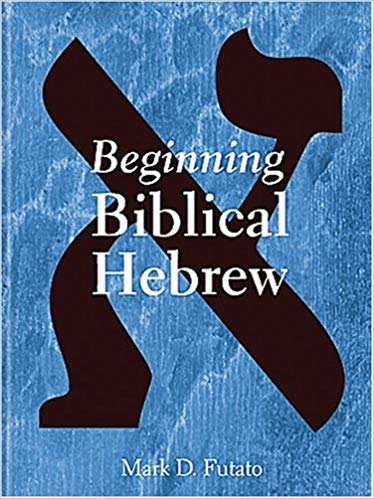Every year, there are more and more textbooks on biblical Hebrew. At first glance, it might seem that these are redundant; after all, how many different ways can someone teach biblical Hebrew?
However, each textbook has something unique to offer and the question becomes not which is best? but which one is best for my learning style?
Mark Futato’s Beginning Biblical Hebrew is the one that I’ve been using for a number of years in the classroom.
Pros: 1) Futato does a good job of explaining each concept without getting overly technical or overly simplistic, 2) the lay-out of each page is easy on the eyes, 3) the vocabulary for each lesson reflects words that appear with greatest frequency is the Bible, 4) within the exercises section, Futato always includes exercises that review earlier material, 5) the price is right.
Cons: 1) The answers for the translation exercises are presented side by side with the Hebrew, so you’ve got to be very well disciplined not to glance over, 2) it takes a while to encounter any biblical passages (even modified), so I have created supplemental worksheets that get students into actual texts at an earlier stage.
The First Hebrew Primer: The Adult Beginner’s Path to Biblical Hebrew is probably the most popular textbook used outside the classroom (some teachers use it in courses).
Pros: 1) The book is very easy to understand because each concept and form is presented in a simple manner, without using any jargon at all; 2) the typeface is clear and easy to follow, 3) students begin reading passages (not just sentences) early on in the textbook, 4) the publishers sell additional materials to support learning like vocabulary lists, 5) the book is affordable.
Cons: 1) At times, the explanations are overly simplistic which can make it harder to learn more complex forms, 2) the Hebrew passages are “Tall Tales,” classic fairy tales adapted and written in biblical Hebrew style, 3) the verb paradigms are presented according to the norms of modern Hebrew textbooks, not classical Hebrew textbooks.
Biblical Hebrew for Students of Modern Israeli Hebrew, by Marc Zvi Brettler, is one of the most rigorous and comprehensive texts books out there. (Full disclosure: the author was my teacher and he has been a life-long mentor.)
Pros: 1) By the time you get through the book, you can consider yourself an lay expert in the language; 2) Brettler focuses on phonology (that is, how the sounds of the language work) and this foundation makes it much easier to learn verbal forms; 3) this textbook has extensive exercises and gets students into real biblical passages early on.
Cons: 1) The layout of the book is not easy on the eyes; 2) if you are not inclined toward an appreciation of linguistics, the book may be too technical for you; 3) the book is no longer in print so you need to dig around for a used copy.
C.L. Seow’s A Grammar for Biblical Hebrew, continues to be classic textbook used in colleges and universities.
Pros: 1) Most students respond positively to it in classroom settings; 2) Seow’s exercises include translations from English into biblical Hebrew, which is difficult but extremely effective pedagogically; 3) the texbook is clear enough that students can use it for learning independently; 4) the book includes a lot of exercises incorporating actual biblical texts.
Cons: 1) Seow uses a lot of transliteration in his textbook which can be distracting once students know the Hebrew alphabet.
A recent book to hit the market is Introduction to Hebrew: A Guide for Learning and Using Biblical Hebrew, by William Fullilove.
Pros: 1) From the very first chapter, Fullilove introduces students to tools for interpreting biblical texts which provides students with a break from the nuts and bolts of language learning; 2) Fullilove’s textbook has received high praise from a variety of biblical scholars; the book is very reasonably priced.
Cons: 1) The book is not as rich in exercises as some others; 2) this texbook does not have verb charts at the end.
